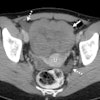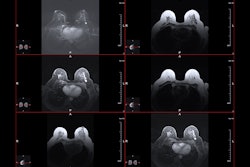Preoperative breast MRI improves surgical planning by detecting additional lesions, but disparities in its use remain, according to a study published October 9 in the Journal of the American College of Radiology.
Prior research has shown that there are disparities in the use of preoperative breast MRI among breast cancer patients, "raising concerns about equitable access to this imaging tool," noted a team led by Chi Trinh, MD, of Johns Hopkins Medicine in Baltimore.
"We found that older patients, Black patients, individuals with Medicaid or Medicare, and those without full-time employment were significantly less likely to undergo [preoperative breast] MRI," the group wrote.
Use of preoperative MRI to manage newly diagnosed breast cancer has increased over the past 20 years, but as its moderate specificity can lead to false positives, debate over which patients should undergo the exam continues, the team wrote. Significant evidence exists that women in racial and ethnic minorities and those from lower socioeconomic backgrounds often face barriers to breast cancer screening as well as advanced imaging for further diagnostic workup, but "little research has focused on potential racial and socioeconomic disparities in the use of preoperative MRI among patients with newly diagnosed breast cancer," the group explained.
Trinh and colleagues conducted a study that included 1,792 patients who underwent breast surgery following a new breast cancer diagnosis between July 2016 and December 2022. They compared patient characteristics between those individuals who did undergo preoperative MRI (992) and those who did not (800).
Overall, the investigators found that preoperative breast MRIs were performed more often in patients younger than 50 and between the ages of 51 and 70 compared with those over 70 and that more white women and women of other races underwent the exam compared with Black women.
Demographic characteristics of women who did and did not undergo preoperative MRI after breast cancer diagnosis | ||
Characteristic | No preop MRI | Preop MRI |
Age | ||
| <=50 | 23% | 77% |
| 51-70 | 50% | 50% |
| >70 | 75% | 25% |
Race | ||
| Black | 56% | 44% |
| Other | 38% | 62% |
| White | 45% | 55% |
Insurance | ||
| Commercial | 35% | 65% |
| Medicaid | 43% | 57% |
| Medicare | 66% | 34% |
| Other | 42% | 58% |
The researchers also reported the following:
- The rate of preoperative breast MRI increased with increasing breast density (p < 0.001) and higher tumor stage (p < 0.001).
- The rate of preoperative breast MRI was also influenced by receptor status and histology, with the highest use in patients with HER2+ enriched disease (p < 0.001) and patients with invasive lobular carcinoma (p < 0.001).
- Among those who received preoperative breast MRI, 51.5% were found to have additional suspicious lesions, and 69.1% of these patients underwent an image-guided biopsy.
- Patients who had a preoperative breast MRI exam underwent mastectomy more often than those who did not (49% compared with 31%, p < 0.001) but were less likely to require reexcision (8% compared with 14%, p < 0.001).
The study "[elucidates] persistent racial and socioeconomic disparities in the use of preoperative breast MRI among patients with newly diagnosed breast cancer," according to the authors.
"These findings suggest that preoperative MRI may improve surgical planning and patient outcomes, but also reflect disparities that must be addressed to ensure equitable access to breast cancer care," they concluded.
The complete study can be found here.




















